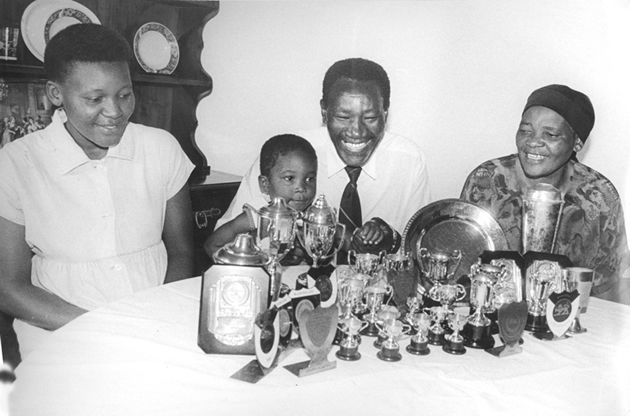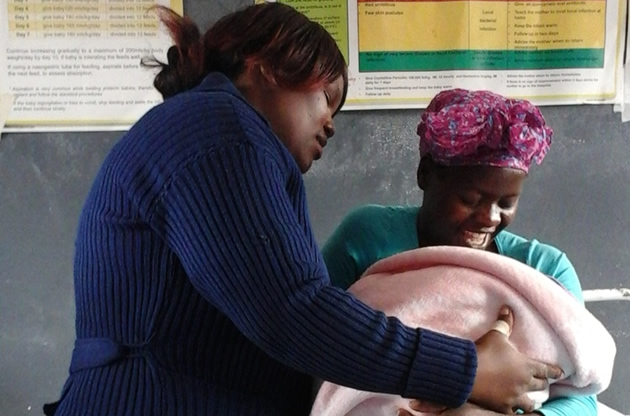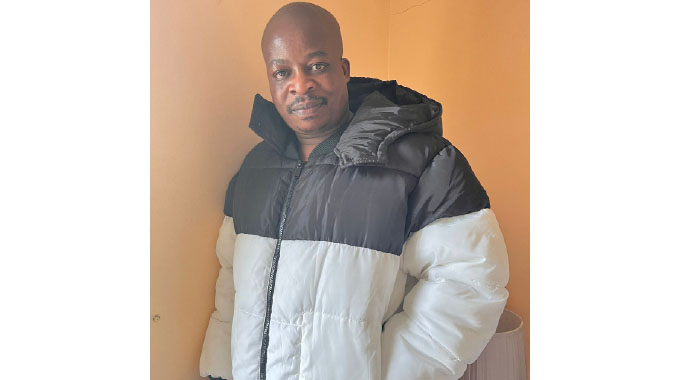Tragedy of African athletes


IN HAPPIER TIMES . . . Artwell Mandaza proudly displays some of the many medals he won during his time while flanked by his late wife (right) daughter (left) and grandson at their Bindura home
Tommy Sithole Special Sports Correspondent
ON Sunday I drove almost 150 kilometres deep into the Chiweshe rural areas north of Harare to mourn with an iconic figure who was burying his wife who died during the festive season after battling a long-term heart condition.
The rural folk came in their dozens and so did many city dwellers who were visiting their villages for Christmas.
The iconic figure is none other than Artwell Mandaza, a name that makes no sense to non-Zimbabweans but whose exploits as a 100 and 200-metre sprinter in the 1970s firmly established him as the best track star this country has ever produced.
Tragically he never competed in the Olympic Games because his incredible 10,3 to 9,9 second searing sprints were performed when pariah “state” of Rhodesia was barred from the Olympic Games.
Artwell went on to coach athletes for the 1984 and 1988 Olympics for Zimbabwe. His heart and soul was in track and field. He inspired the young and lit up the tracks across the nation.
Single-handedly, Artwell made the athletics the sport of choice in the mining communities. In 1970, Rhodesian sport could not continue to avoid his incredible exploits.
Rather reluctantly, they handed him the Sportsman of the Year trophy, the first time that a black person had ever been so honoured in this country. The younger folks remember him as the athlete who raced against Chesterfield the racehorse in 1984 to raise money for the Olympic team.
The tragedy is that Artwell is a typical fit of the sad former high-flying athletes in Africa. They fall on hard times the moment they are through their running or, in the case of football, playing careers. For a “chosen few”, those that make it nowadays to the Olympic Games, the International Olympic Committee has instituted a post-competitive life career programme. It’s nowhere near enough but it is a great start.
It’s too late for the likes of Artwell, his equalling the world 100 metres record in the 1970s notwithstanding. He is just another statistic. He is lucky that a friend, a sports equipment dealer Mark Manolios, came to hear about his plight from someone and happened to mention it to me.
By the time we contacted Artwell, his wife had just passed on. He was in mourning and was so happy to hear my voice.
It is customary in Zimbabwe to contribute a couple of dollars to help with funeral expenses. A colleague and I “burned” the cellphone signals as we raced towards the little village outpost, calling friends and associates. By the time we got there pledges had ballooned to an incredible $1 000.
First to come to the table were mobile phone operator Econet subsidiary EcoSure. Then Mark, businessman Musekiwa Kumbula and two young Cabinet ministers!
One of the ministers was on the highway, driving himself to Harare. He made a U-turn and was there in time to see off the relatives as the procession made its way to the graveyard. Artwell has battled health problems. He was so overwhelmed by our presence he was in tears.
The Salvation Army crowd did a splendid job of supporting him and, in their own way, gave the lady a truly dignified send-off.
During the time I spent at the IOC one of my occupation was to look after the likes of Artwell. Uganda’s first Olympian was a pauper, living in what in KiSwahili is termed as “mbavu za umbwa”, dog’s ribs. These are the poles and dagga thatched huts where the poorest of the poor live.
With a personal donation from then UN Messenger of Peace, HRH Princess Haya Bint Hussein, wife of the Ruler of Dubai, we built a proper house for the former athlete, furnished it and put him on a decent allowance until he died.
Remember John Stephen Akwari. The marathoner who refused to give up at the 1968 Olympics in Mexico and hobbled in hours after shutdown? He was also down on his luck, living in Mbulu in Tanzania where those who knew him could not see him in his tattered clothes. He too had a lift in life from the IOC project and, like others, was put on a good allowance and received decent clothing donations from the IOC.
Musekiwa Kumbula’s suggestion that it is high time Africa took care of its own in a more organised way is worth developing further. There are just too many Artwells across Africa. Ad hoc arrangements cannot be allowed to be the norm. Artwell is in a bad shape, both physically and financially. His situation can only be addressed now. Funny he was not bitter about life and the way sport had abandoned him. The passion about sport is still there. And the fact that there was someone from the Olympics and a Cabinet minister sitting there to console him was big enough.
If only he could retrieve his two gold medals from the Government so that he could sell them and continue to live, he mused.
I promised Artwell I would visit him again soon, very soon. Hopefully then there will be more than a tethered goat outside his humble “mbavu za umbwa” abode.
This man deserves better.











Comments